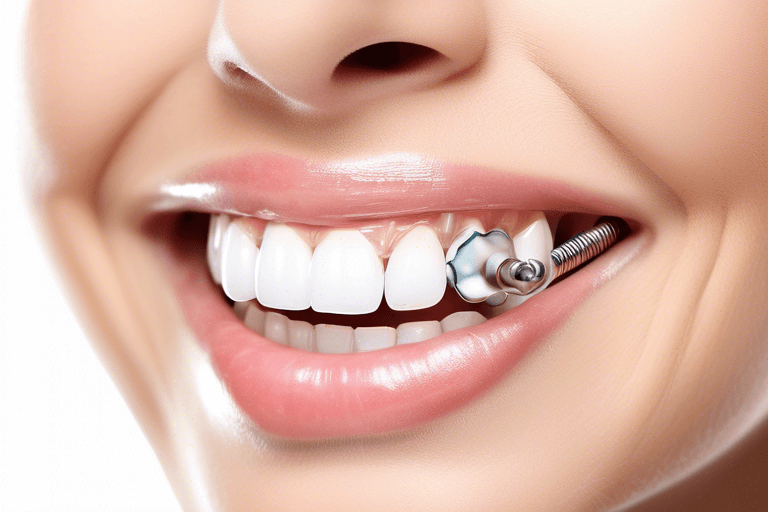Health
Dental Implants: A Complete Guide to Restoring Your Smile

Dental health plays a crucial role in overall well-being, and missing teeth can affect not just appearance but also confidence, speech, and the ability to eat comfortably. One of the most effective and long-lasting solutions to replace missing teeth is dental implants. Over the past few decades, dental implants have revolutionized restorative dentistry, providing patients with natural-looking, functional, and durable replacements.
In this article, we will explore what dental implants are, their benefits, the procedure, recovery, cost, risks, and how they compare with other tooth replacement options.
What Are Dental Implants?
A dental implant is an artificial tooth root made of titanium or zirconia, surgically inserted into the jawbone to support a crown, bridge, or denture. It functions just like a natural tooth root, offering a permanent foundation for artificial teeth.
Key Components of Dental Implants
- Implant Fixture – The titanium or zirconia post placed into the jawbone.
- Abutment – A connector that attaches the implant to the replacement tooth.
- Crown – The visible, custom-made artificial tooth that looks like a natural tooth.
Why Choose Dental Implants?
Dental implants stand out because they offer advantages beyond aesthetics.
- Natural Appearance: Implants look, feel, and function like natural teeth.
- Durability: With proper care, they can last a lifetime.
- Preservation of Jawbone: They prevent bone loss that typically occurs after tooth loss.
- Improved Confidence: Patients regain the ability to smile and eat without worry.
- No Damage to Adjacent Teeth: Unlike bridges, implants do not require grinding down neighboring teeth.
Who Is a Good Candidate for Dental Implants?
While implants are highly successful, not everyone qualifies immediately. Ideal candidates typically have:
- Healthy gums with no active periodontal disease.
- Adequate bone density in the jaw.
- Good overall health without uncontrolled chronic conditions.
- Non-smokers or those willing to quit (smoking hinders healing).
For patients with insufficient bone, bone grafting procedures may be recommended before implant placement.
The Dental Implant Procedure
1. Initial Consultation and Planning
The dentist evaluates oral health through X-rays, CT scans, and impressions. A treatment plan is created, considering the number of missing teeth and bone health.
2. Implant Placement
Under local anesthesia or sedation, the implant fixture is surgically placed into the jawbone. Healing time is required for the implant to integrate with the bone through a process called osseointegration. This can take 3–6 months.
3. Abutment Placement
After healing, a minor procedure attaches the abutment to the implant. This serves as the anchor for the crown.
4. Crown Placement
Finally, a custom-made crown is placed, restoring full function and aesthetics.
Types of Dental Implants
- Endosteal Implants – The most common type, placed directly into the jawbone.
- Subperiosteal Implants – Placed under the gum but above the jawbone, suitable for patients with less bone density.
- All-on-4 Implants – A technique where four implants support an entire arch of teeth, ideal for patients who need full-mouth restoration.
Recovery and Aftercare
Healing after implant surgery varies depending on the individual and the complexity of the procedure.
- First 24–48 hours: Mild swelling, bruising, or discomfort may occur.
- First week: Patients should stick to soft foods and avoid heavy chewing.
- 3–6 months: Bone integration takes place, during which oral hygiene is crucial.
Aftercare tips include:
- Brushing and flossing regularly.
- Avoiding smoking and alcohol.
- Attending regular dental check-ups.
Cost of Dental Implants
The cost of dental implants varies based on several factors:
- Number of implants needed.
- Type of implant and materials used.
- Geographic location and dentist’s expertise.
- Need for additional procedures like bone grafting or sinus lifts.
On average, a single dental implant in the U.S. can cost between $3,000 and $5,000. Though expensive upfront, implants are a cost-effective long-term investment compared to dentures or bridges that may require frequent replacement.
Risks and Complications
Dental implants are generally safe, but like any surgical procedure, they carry risks:
- Infection at the implant site.
- Implant failure due to poor bone integration.
- Nerve damage causing pain or numbness.
- Sinus issues for implants placed in the upper jaw.
Choosing an experienced dental professional significantly reduces these risks.
Dental Implants vs. Other Tooth Replacement Options
| Feature | Dental Implants | Bridges | Dentures |
|---|---|---|---|
| Durability | Lifetime | 10–15 yrs | 5–10 yrs |
| Bone Preservation | Yes | No | No |
| Natural Look/Feel | Excellent | Good | Fair |
| Maintenance | Easy | Moderate | High |
Verdict: Implants are superior in durability, function, and appearance, making them the preferred modern solution.
Benefits Beyond Oral Health
Dental implants not only restore smiles but also improve mental and emotional well-being. Patients report:
- Greater self-esteem.
- Better speech clarity.
- Improved ability to chew and enjoy food.
- A sense of youthfulness due to preserved facial structure.
Frequently Asked Questions (FAQ)
Q1: How long do dental implants last?
With proper care, implants can last a lifetime, though crowns may need replacement after 15–20 years.
Q2: Is the procedure painful?
Most patients report minimal pain due to anesthesia, with mild discomfort during recovery.
Q3: Can anyone get dental implants?
Most healthy adults can. However, those with uncontrolled diabetes, heavy smokers, or patients with insufficient bone may need additional treatments.
Q4: Are dental implants covered by insurance?
Basic dental insurance often does not cover implants, but some plans offer partial coverage. Patients should check with their providers.
Q5: How do I care for dental implants?
Maintain oral hygiene through brushing, flossing, and regular dental visits, just like natural teeth.
Conclusion
Dental implants are a life-changing solution for anyone struggling with missing teeth. They restore function, protect oral health, and boost confidence, making them the gold standard in modern dentistry. While the procedure may require time and investment, the long-term benefits far outweigh the initial costs.
If you are considering dental implants, consult a qualified dental professional to determine the best treatment plan for your needs.

-

 Biography5 months ago
Biography5 months agoKristi Noem Height: Everything You Need to Know About the South Dakota Governor
-

 Biography5 months ago
Biography5 months agoOrlando Schwerdt: A Deep Dive into His Life and Legacy
-

 Biography4 months ago
Biography4 months agoJann Mardenborough Accident: A Defining Moment in His Racing Journey
-

 Biography4 months ago
Biography4 months agoAlexis Danson: Inspiring Journey of Talent and Resilience
-

 Celebrat5 months ago
Celebrat5 months agoParker McCollum Height: Everything You Need to Know About the Country Star
-

 Biography5 months ago
Biography5 months agoRobert Peston Illness: Grief, Autoimmune Response & Mental Health Journey
-

 Biography5 months ago
Biography5 months agoMarten Glotzbach: Life, Career, and Inspiring Journey
-

 Biography5 months ago
Biography5 months agoElsie-Rose Thomas: A Rising Star You Need to Know About



